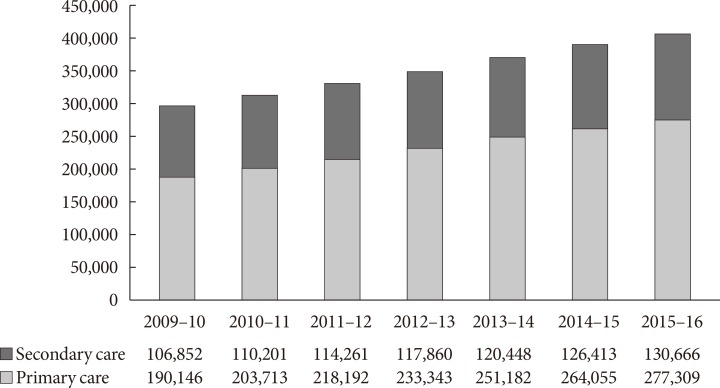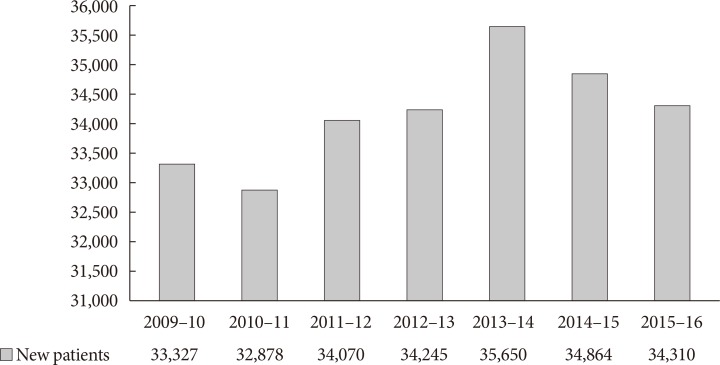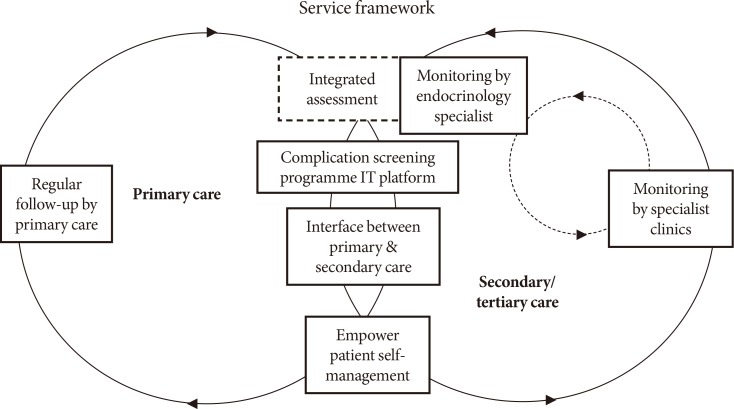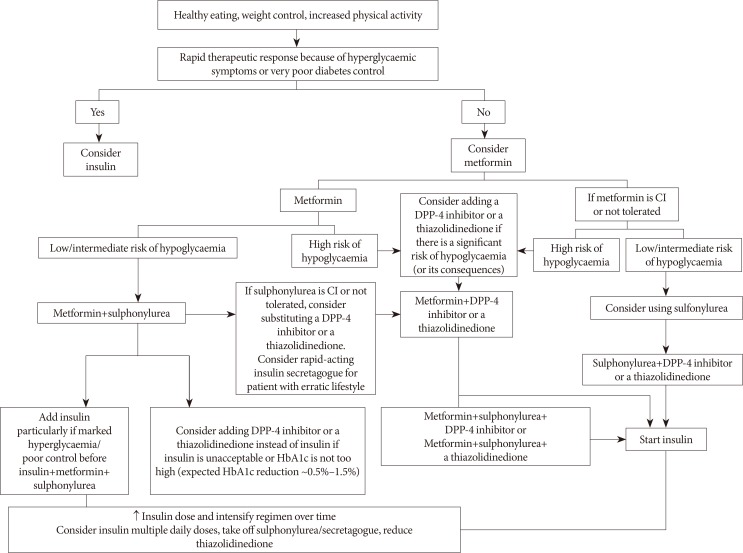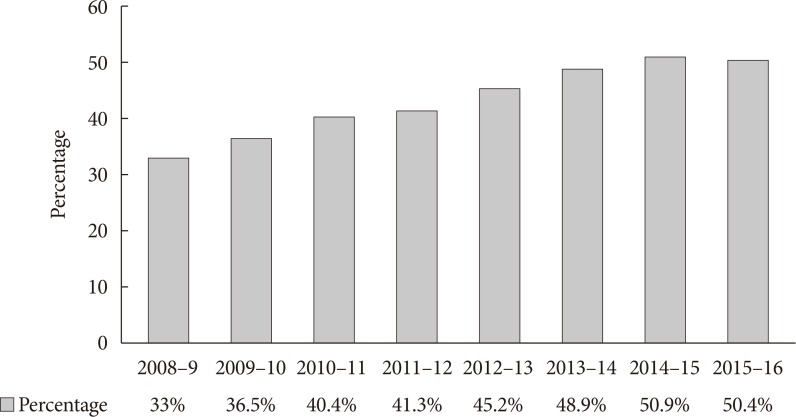Diabetes Metab J.
2017 Apr;41(2):81-88. 10.4093/dmj.2017.41.2.81.
A Clinical Practice Guideline to Guide a System Approach to Diabetes Care in Hong Kong
- Affiliations
-
- 1Department of Medicine, Tseung Kwan O Hospital, Hong Kong. lauit@ha.org.hk
- 2Central Committee on Diabetic Services, Hong Kong Hospital Authority, Hong Kong.
- KMID: 2376769
- DOI: http://doi.org/10.4093/dmj.2017.41.2.81
Abstract
- The Hospital Authority of Hong Kong is a statutory body that manages all the public medical care institutions in Hong Kong. There are currently around 400,000 diabetic patients under its care at 17 hospitals (providing secondary care for 40%) and 73 General Outpatient Clinics (providing primary care for 60%). The patient population has been growing at 6% to 8% per year over the past 5 years, estimated to include over 95% of all diagnosed patients in Hong Kong. In order to provide equitable and a minimal level of care within resources and local system factors constraints, a Clinical Practice Guideline on the management of type 2 diabetes mellitus was drawn in 2013 to guide a system approach to providing diabetes care. There is an algorithm for the use of various hypoglycemic agents. An organizational drug formulary governs that less expansive options have to be used first. A number of clinical care and patient empowerment programs have been set up to support structured and systematic diabetes care. With such a system approach, there have been overall improvements in diabetes care with the percentage of patients with glycosylated hemoglobin <7% rising from 40% in 2010 to 52% in 2015.
Keyword
MeSH Terms
Figure
Cited by 1 articles
-
Evolution of Diabetes Care in Hong Kong: From the Hong Kong Diabetes Register to JADE-PEARL Program to RAMP and PEP Program
Ivy H.Y. Ng, Kitty K.T. Cheung, Tiffany T.L. Yau, Elaine Chow, Risa Ozaki, Juliana C.N. Chan
Endocrinol Metab. 2018;33(1):17-32. doi: 10.3803/EnM.2018.33.1.17.
Reference
-
1. International Diabetes Federation. IDF diabetes atlas. 7th ed. Brussels: International Diabetes Federation;2015.2. Chan BS, Tsang MW, Lee VW, Lee KK. Cost of type 2 diabetes mellitus in Hong Kong Chinese. Int J Clin Pharmacol Ther. 2007; 45:455–468. PMID: 17725179.
Article3. Bloomberg. U.S. Health-care system ranks as one of the least-efficient: America is number 50 out of 55 countries that were assessed. updated 2016 Sep 29. Available from: http://www.bloomberg.com/news/articles/2016-09-29/u-s-health-care-system-ranks-as-one-of-the-least-efficient.4. Wong KC, Wang Z. Prevalence of type 2 diabetes mellitus of Chinese populations in Mainland China, Hong Kong, and Taiwan. Diabetes Res Clin Pract. 2006; 73:126–134. PMID: 16563548.
Article5. Fung CS, Chin WY, Dai DS, Kwok RL, Tsui EL, Wan YF, Wong W, Wong CK, Fong DY, Lam CL. Evaluation of the quality of care of a multi-disciplinary risk factor assessment and management programme (RAMP) for diabetic patients. BMC Fam Pract. 2012; 13:116. PMID: 23216708.
Article6. Chan J, So W, Ko G, Tong P, Yang X, Ma R, Kong A, Wong R, Le Coguiec F, Tamesis B, Wolthers T, Lyubomirsky G, Chow P. The Joint Asia Diabetes Evaluation (JADE) Program: a web-based program to translate evidence to clinical practice in type 2 diabetes. Diabet Med. 2009; 26:693–699. PMID: 19573118.
Article7. Jiao FF, Fung CS, Wong CK, Wan YF, Dai D, Kwok R, Lam CL. Effects of the Multidisciplinary Risk Assessment and Management Program for Patients with Diabetes Mellitus (RAMP-DM) on biomedical outcomes, observed cardiovascular events and cardiovascular risks in primary care: a longitudinal comparative study. Cardiovasc Diabetol. 2014; 13:127. PMID: 25142791.
Article8. Jiao F, Fung CS, Wan YF, McGhee SM, Wong CK, Dai D, Kwok R, Lam CL. Long-term effects of the multidisciplinary risk assessment and management program for patients with diabetes mellitus (RAMP-DM): a population-based cohort study. Cardiovasc Diabetol. 2015; 14:105. PMID: 26268736.
Article9. Jiao F, Fung CS, Wan YF, McGhee SM, Wong CK, Dai D, Kwok R, Lam CL. Effectiveness of the multidisciplinary Risk Assessment and Management Program for Patients with Diabetes Mellitus (RAMP-DM) for diabetic microvascular complications: a population-based cohort study. Diabetes Metab. 2016; 42:424–432. PMID: 27568125.
Article10. Steinsbekk A, Rygg LO, Lisulo M, Rise MB, Fretheim A. Group based diabetes self-management education compared to routine treatment for people with type 2 diabetes mellitus. A systematic review with meta-analysis. BMC Health Serv Res. 2012; 12:213. PMID: 22824531.
Article11. Duke SA, Colagiuri S, Colagiuri R. Individual patient education for people with type 2 diabetes mellitus. Cochrane Database Syst Rev. 2009; (1):CD005268. PMID: 19160249.
Article12. Jarvis J, Skinner TC, Carey ME, Davies MJ. How can structured self-management patient education improve outcomes in people with type 2 diabetes? Diabetes Obes Metab. 2010; 12:12–19. PMID: 19788430.
Article13. Wong CK, Wong WC, Lam CL, Wan YF, Wong WH, Chung KL, Dai D, Tsui EL, Fong DY. Effects of Patient Empowerment Programme (PEP) on clinical outcomes and health service utilization in type 2 diabetes mellitus in primary care: an observational matched cohort study. PLoS One. 2014; 9:e95328. PMID: 24788804.
Article14. Wong CK, Wong WC, Wan YF, Chan AK, Chung KL, Chan FW, Lam CL. Patient Empowerment Programme in primary care reduced all-cause mortality and cardiovascular diseases in patients with type 2 diabetes mellitus: a population-based propensity-matched cohort study. Diabetes Obes Metab. 2015; 17:128–135. PMID: 25251664.
Article15. Wong CK, Wong WC, Wan YF, Chan AK, Chan FW, Lam CL. Patient Empowerment Programme (PEP) and risk of microvascular diseases among patients with type 2 diabetes in primary care: a population-based propensity-matched cohort study. Diabetes Care. 2015; 38:e116–e117. PMID: 26207061.
Article16. Wong CK, Wong WC, Wan YF, Chan AK, Chan FW, Lam CL. Effect of a structured diabetes education programme in primary care on hospitalizations and emergency department visits among people with type 2 diabetes mellitus: results from the Patient Empowerment Programme. Diabet Med. 2016; 33:1427–1436. PMID: 26433212.
Article
- Full Text Links
- Actions
-
Cited
- CITED
-
- Close
- Share
- Similar articles
-
- The Growing Problem of Radiologist Shortage: Hong Kong’s Perspective
- Evolution of Diabetes Care in Hong Kong: From the Hong Kong Diabetes Register to JADE-PEARL Program to RAMP and PEP Program
- Summary of the American Diabetes Association Standards of Medical Care in Diabetes 2016
- Summary of the American Diabetes Association Standards of Medical Care in Diabetes 2012
- Summary of Insulin Therapy for Adult Patients with Type 2 Diabetes Mellitus: A Position Statement of the Korean Diabetes Association, 2017

